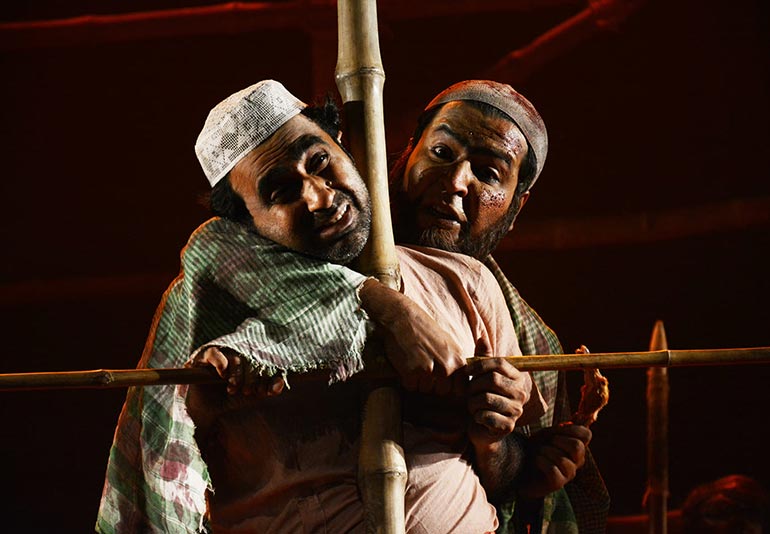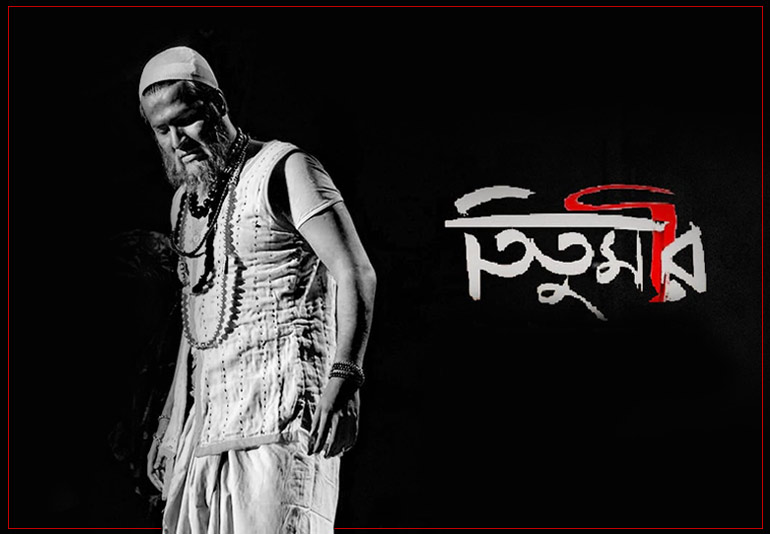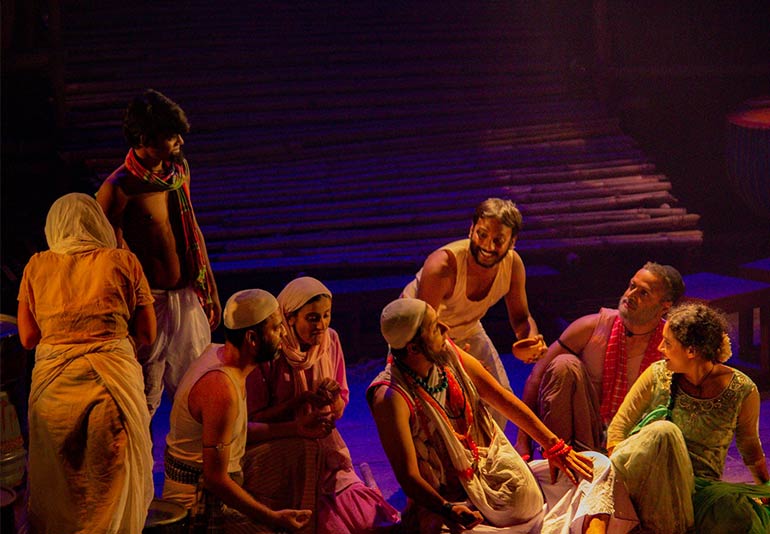Did Delhi cancel 'Titumir' to delude the contribution of Muslims in India’s freedom struggle?

The 1940s were an epoch of transformation globally. At the beginning of World War II in September 1939, India was deeply embroiled in the struggle for independence. Till then, Calcutta was a thriving metropolis and, commercially, culturally, and politically, one of India’s two major urban centres. Despite the city’s commercial robustness, there was urban poverty, and large sections of Bengal’s peasantry were struggling under iniquitous conditions created by the zamindari system and the complicit British Raj that arched over that system. Then the Great Bengal Famine ravished the province. Although the peak of the famine was between 1943 and 1944, the aftershocks in the form of cholera and typhoid continued into 1945 and beyond. The death toll was close to three million. And in mid-1946 came the massive communal killings of Calcutta that presaged the violence of Partition in both Bengal and Punjab. Taking advantage of this catastrophe, a class of indigenous baniyas raised their ugly heads, intending to make quick money by unscrupulous means. However, this was also the time when a large number of socially and politically conscious artists and writers took a stand. Mass movements ensued that led to the formation of the anti-fascist Writers' and Artists' Association, the People's Theatre Movement.

Tulsi Lahiri, Sombhu Mitra, Bijan Bhattacharya, and Ritwik Ghatak, educated urban middle-class intellectuals and artists, left the secure city life to observe and create theatre for the masses. "Chhenra Taar," ‘Nobanno’, 'Dukhir Iman' and ‘Jwala’ were written and staged. The primary goal of staging these plays was to raise public awareness about fascist exploitation. In this cultural movement, thespian Utpal Dutt made a significant contribution. These authors, dramatists, and performing artistes made their political stand very clear: they were against any despotic ruler and protested against fascism of any kind. Their protest movement not only drew the attention of colonial rulers, but it also shook the very foundations of the British Monarchy. Utpal Dutt wrote the play, 'Titumir' and depicted the inhuman repressive measures used by the British government to suppress Indians. The cultural mass movement that was initiated in the 1940s and 50s still exists. The movement has been kept alive by dedicated thespians like Joyraj Bhattacharya, who has set up Theatre Formation Parivartak Natya Goshthi.
 Joyraj Bhattacharya
Joyraj Bhattacharya
We are discussing all this because recently, Bengali and Indian theatre witnessed a bizarre incident. Theatre director Joyraj Bhattacharya has recreated Utpal Dutta's play, 'Titumir' which has already been staged 23 times at different public auditoriums. Recently, the National School of Drama (NSD) Delhi, invited Jayaraj to stage 'Titumir' but later cancelled the show abruptly. The reason for this cancellation has been explained by NSD thus, the show had to be cancelled because Joyraj’s theatre group had not sent a video recording of the play for approval. Bhattacharya was stunned as he shared his views. He said, "It is utterly ridiculous and strange to invite formally and then ask for a video. NSD wanted to see the script of the play first, and I willingly sent it over to the authorities. But on January 18, the NSD authorities sent a letter stating the show was canceled due to the non-availability of video recording. We had already booked our tickets for Delhi since the show was scheduled for staging on February 22." Bhattacharya says, "UtpalDutt wrote this play against the British government, why is the Modi government being so hypersensitive about the drama?" He continues, "To participate in the Bharat Rang Mahotsav, applications have to be sent along with video records. Based on that recording and application, the selection committee nominates a play. Apart from this, the committee also chooses to send invitations to plays that they consider 'Outstanding Productions'. In the case of 'Titumir', the invitation came in that category. Shortly after we were invited, repeated calls were made to us with myriad questions about the play. The script of the play was sought, and we sent it. I was asked, "What is the play about? And I obviously replied, 'About Titumir."
The caller said from the other end "Haan, woh toh maloom hai’ (Yes, we are aware of it). Bhattacharya asked, "Then?" He continues, "I am specifying this conversation because all through my interaction with the NSD authorities, I communicated in English and the government representatives spoke to me in Hindi. They wanted to confirm from me whether the play was anti-government or not. "Yes, it's against the government, against the British government." Apparently, the theme of this year's festival is 'Unsung Heroes of Indian Freedom Struggle'."
'Titumir', is an old production of Theatre Formation Parivartak Natya Goshthi. Titumir, also known as Syed Mr Nisr Al, was a Bengali freedom fighter who cultivated a strand of Muslim nationalism in tandem with agrarian and political consciousness. He fought against the British rulers and organized the peasants against the zamindars of Bengal. He is famed for having built a large bamboo fort to resist the British, which passed onto Bengali folk legend.

In the Indian subcontinent’s history of the freedom struggle, the name of Mir Nisar Ali aka Titumir still shines bright. Titumir united the Hindu and Muslim peasants and encouraged them to take up arms against the oppressive regimes of zamindars and British indigo planters. Many farmers from 24 Parganas and Nadia responded to his call and participated in the agitation. Titumir wanted to remedy the atrocities on the subjects peacefully and through compromise. But failing, he declared a revolt against the British in Barasat. This was his first rebellion against the East India Company.
The play that once dealt with the War of Independence, now boldly criticizes the recent agitations in the country and points fingers against intolerance in all spheres of life. A bamboo fort is built on the stage, and the story of the life of a Muslim leader who was fair and ruled over his subjects with a soul is told in the chiaroscuro created by the beautiful play of light and shadow. Bhattacharya presents the Bengal farmers' struggle for Independence in a very unique way.

The play ‘Titumir’ once again reveals that the country’s war of Independence was not based on religion. It is a history of resistance by poor peasants and labourers. ‘Imperialist politics is gradually preparing to assault the Third World in a new form. We are once again forced to re-read that history of imperialism. Besides, attempts are also being made to erase the contribution of the Muslim community in the struggle for Independence. We want to thwart the efforts of the state. We are staging a play that’s apt for the times, and they too, have not failed to notice that. Titumir's arrow has pierced the right target.’
Riddhibesh Bhattacharya, another actor in the play and member of the theatre group, says, "It is the very essence of art to become competitive and to challenge. The state never welcomes this competition." Titumir, the popular leader, and Utpal Dutt’s play, based on his life, had been able to shake the very foundation of the then-state power. Does the current central government feel provoked? Questions have been surfacing from all quarters of the cultural world.










